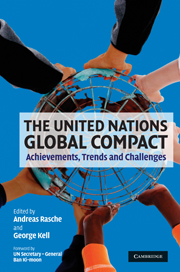Book contents
- Frontmatter
- Contents
- List of figures
- List of tables
- List of boxes
- List of abbreviations
- List of contributors
- Acknowledgements
- Foreword
- Why This Book Matters!
- The Ten Principles of the United Nations Global Compact
- 1 Introduction: the United Nations Global Compact – retrospect and prospect
- Part I Achievements, trends and challenges: reflections on the Principles
- 2 Making sense of the United Nations Global Compact human rights principles
- 3 The promise of the United Nations Global Compact: a trade union perspective on the labour principles
- 4 The United Nations Global Compact Environmental Principles: achievements, trends and challenges
- 5 ‘Caring for Climate’: the Business Leadership Platform
- 6 Anti-corruption: challenges and trends
- Part II Participants and engagement mechanisms
- Part III Governance and Communication on Progress
- Part IV Local Networks: the emerging global–local link
- Glossary
- Bibliography
- Index
5 - ‘Caring for Climate’: the Business Leadership Platform
Published online by Cambridge University Press: 05 February 2012
- Frontmatter
- Contents
- List of figures
- List of tables
- List of boxes
- List of abbreviations
- List of contributors
- Acknowledgements
- Foreword
- Why This Book Matters!
- The Ten Principles of the United Nations Global Compact
- 1 Introduction: the United Nations Global Compact – retrospect and prospect
- Part I Achievements, trends and challenges: reflections on the Principles
- 2 Making sense of the United Nations Global Compact human rights principles
- 3 The promise of the United Nations Global Compact: a trade union perspective on the labour principles
- 4 The United Nations Global Compact Environmental Principles: achievements, trends and challenges
- 5 ‘Caring for Climate’: the Business Leadership Platform
- 6 Anti-corruption: challenges and trends
- Part II Participants and engagement mechanisms
- Part III Governance and Communication on Progress
- Part IV Local Networks: the emerging global–local link
- Glossary
- Bibliography
- Index
Summary
Introduction: a moral issue
The way we consume and produce changes the composition of the planet's atmosphere and, thus, creates a global warming trend that destabilizes our climate. This warming is faster than in any previous era. Climate events like storms, floods, or droughts get fiercer and more frequent. Many species cannot adapt at this speed and biodiversity declines while links in our food chains weaken. Many human infrastructures and activities are also vulnerable to sudden extreme weather events.
The balance between emissions of gases forcing climate change and the planet's ability to absorb and neutralize them has been disturbed by our massive combustion of fossil fuels. Take carbon dioxide: 15–30 per cent of any release persists for centuries and, therefore, adds a factor of certainty to the global risks. Now make the connection: anyone in charge of a source of CO2 or causing someone to release CO2 (or any other greenhouse gas) shares a moral responsibility in the current and future consequences of climate change, even in the most remote places of the world. Because every person has a right to a safe environment, to energy, work and comfort that neither weaken our living planet nor endanger the prospects of future generations, the Global Compact signatories should feel compelled to act. Their duty not only arises from the obvious precautionary approach, the support for environmental responsibility and the promotion of climate-friendly technologies, but more fundamentally from their core commitment to the respect of human rights, their engagement to fight poverty and contribute to a better society.
- Type
- Chapter
- Information
- The United Nations Global CompactAchievements, Trends and Challenges, pp. 80 - 100Publisher: Cambridge University PressPrint publication year: 2010
- 1
- Cited by



